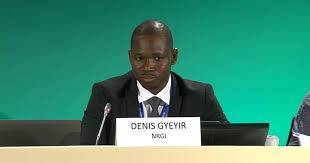FEC 2025: NRGI Warns Fossil Fuel Investments Risk Undermining Africa’s Energy Transition; Lists Innovative Financing Instruments to Plug Transition Funding Shortfall
The Country Manager for Ghana’s chapter of the Natural Resource Governance Institute (NRGI), Dennis Gyeyir, has cautioned that Africa’s energy transition agenda is under threat, with nearly half of the projected 2025 investment flows into the continent’s energy sector expected to be channelled into fossil fuels.
Making a presentation at the 2025 Future of Energy Conference (FEC) in Accra, themed “Unlocking Finance, Driving Implementation of Transition Plans for Africa’s Inclusive Adaptation Pathways,” Mr Gyeyir said Africa is set to attract about $100 billion in energy investment this year, but the allocation of a significant share to fossil fuels undermines efforts to accelerate the continent’s clean energy shift.
“The future of energy must address the greatest threat to humanity’s existence,” he stressed, adding that without a deliberate shift in financing flows, Africa risks being locked into carbon-intensive pathways at the expense of sustainable growth.
He noted that globally, financing requirements for inclusive adaptation in developing countries’ nationally determined contributions (NDCs) are estimated between $5.1 trillion and $6.8 trillion through to 2030, equivalent to $455–$584 billion annually. Further noting that, developed countries must take the lead, mobilising at least $300 billion per year by 2035, while overall financing from all public and private sources must scale up to at least $1.3 trillion annually by 2035 to meet climate and energy transition goals.
For Ghana, Mr Gyeyir revealed that the country’s energy transition plan will require about $550 billion, with 53% of the financing expected from development finance institutions, 35% from the private sector, and 12% from the government.
To bridge existing funding gaps, he outlined eight innovative financing instruments identified by NRGI, which include: blended finance, debt sustainability frameworks, international climate finance commitments, green bonds and sustainability-linked loans, Just Energy Transition Partnership (JETP) models, regulatory and policy reforms, and international development financing.
He further emphasised that boosting domestic revenue mobilisation is critical to financing Africa’s transition. This, he argued, requires plugging loopholes in the extractive sector through reforms to tackle tax avoidance, cost manipulation, and illicit flows, alongside leveraging carbon taxes, expanding carbon market frameworks, and exploring innovative taxes such as premium flight levies.
“The scramble for critical minerals also offers an opportunity to unlock financing, but most importantly, ensuring accountable use of funds through robust financial management systems is a more potent de-risking mechanism often ignored in the discourse around transition financing,” Mr Gyeyir stated.
The Future of Energy Conference, organised annually by the Africa Centre for Energy Policy (ACEP), brings together policymakers, financiers, civil society actors, and development partners to deliberate on policies and mechanisms for financing Africa’s energy transition and inclusive adaptation pathways.








